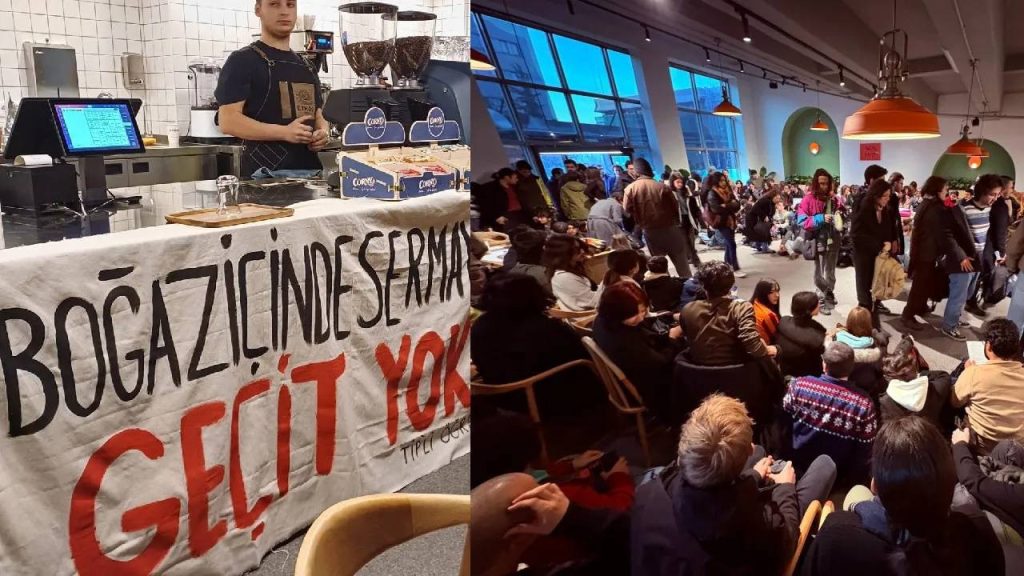Boğaziçi University students have launched an occupation of a newly opened café on campus, protesting against rising prices and demanding the right to establish a student-run collective in the space. The café, which many believe is part of a corporate takeover of campus facilities, has prompted significant backlash as students take matters into their own hands. This ongoing protest, reminiscent of past events concerning corporate influence on educational spaces, reflects deeper discontent among the student body regarding governance and accessibility in their university.
| Article Subheadings |
|---|
| 1) The Origins of the Occupation |
| 2) Student Responses and Actions |
| 3) Allegations Against Corporate Interests |
| 4) Historical Context of Student Protests |
| 5) The Future of Student Governance |
The Origins of the Occupation
The recent student occupation at Boğaziçi University began on February 10, when students discovered that a new café had opened in a central campus location, which they believed would replace their traditional canteen services. Students expressed concerns regarding the financial implications of this corporate café, particularly its decision to charge significantly higher prices compared to their previously available options. The café, dubbed “Occupation Café” by the students, represents their desire for accessible and affordable food and drink on campus. The occupation was organized swiftly, with rapid mobilization by the student body demonstrating their commitment to democratic values and collective action.
Student Responses and Actions
In a show of solidarity and innovative engagement, over 1,000 students rallied around the café, voicing their dissent with powerful slogans and banners such as “We bring our cheap coffee to your expensive tables,” and “No passage for capital in Boğaziçi.” This expression of discontent not only encapsulates the students’ arguments against financial inequality but also highlights their initiative to foster alternative spaces for communal interaction. The students have been actively involved in producing their own coffee and organizing various events within the café space, maintaining a sense of community and agency amid their struggle against institutional decisions they perceive as unjust.
Allegations Against Corporate Interests
The situation has further complicated as accusations arose regarding the role of the café company, known as Espressolab. Despite the corporation’s denial of operating a branch on the university’s premises, students reported seeing the brand’s logo on certain products, fueling suspicions about underlying corporate motives. Espressolab’s ownership is characterized by close ties to governmental entities, raising broader questions about privatization in public universities. This incident echoes concerns regarding corporate influence over education, spurring critical dialogue on the integrity of university governance and the prioritization of profit over student welfare.
Historical Context of Student Protests
The recent protests at Boğaziçi University are part of a larger tapestry of student activism, particularly in the past decade. For instance, a prior protest against the introduction of a Starbucks café on campus resulted in sustained occupation efforts that successfully led to its shutdown and conversion into a study space. Additionally, in 2021, protests against the appointment of a government rector escalated into violent confrontations, underlining persistent tensions between students and administrative authorities. These historical precedents inform the current protest, demonstrating a long-standing tradition of student resistance and advocacy for a more democratically operated academic environment.
The Future of Student Governance
Amidst the ongoing occupation, students have articulated their desire for structural changes that would empower them in governance decisions affecting their university experience. They demand the administration grant them the opportunity to establish a student-run collective within the café space, a move indicative of their broader aspirations for participatory governance. The outcome of these protests could potentially influence university policies and set a precedent for future student-led initiatives. As students continue to pursue their rights and challenge administrative decisions, they are reshaping the narrative of student governance and engagement within educational institutions.
| No. | Key Points |
|---|---|
| 1 | Students at Boğaziçi University are occupying a new café, protesting against high prices and corporate influence on campus life. |
| 2 | During the occupation, students have organized events and created a community space that emphasizes accessibility and affordability. |
| 3 | The café chain Espressolab is under scrutiny due to alleged ties with government interests and accusations of misleading students about its operations. |
| 4 | Historical instances of resistance at Boğaziçi University inform current protests, reflecting a deep-rooted culture of activism among students. |
| 5 | Students are advocating for a collective governance model and substantive changes in their university’s decision-making processes. |
Summary
The student occupation at Boğaziçi University underscores a significant moment in the ongoing struggle for equitable access to campus amenities and the fight against privatization of educational spaces. This episode not only evokes memories of past protests but also serves as a rallying point for students who seek to redefine how governance is exercised within their university. As students continue to negotiate their demands with university officials, the outcomes of this occupation could shape the future landscape of student participation and influence in institutional decisions.
Frequently Asked Questions
Question: What triggered the occupation at Boğaziçi University?
The occupation was triggered by the opening of a new café that students believed would replace affordable dining options, coupled with concerns over rising prices and corporate influence on campus.
Question: Who is Espressolab, and what is its connection to the protest?
Espressolab is a café chain with alleged ties to the government, and students have accused it of misleading them about its presence on campus, which fueled their protests against corporate influences.
Question: What are the students demanding from the university administration?
Students are demanding the right to establish a student-run collective within the café space and are calling for more participatory governance in decision-making processes at the university.


